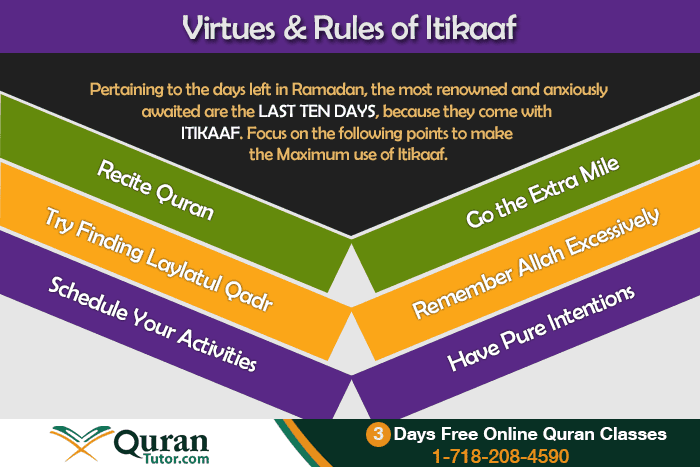Virtues of Itikaaf, Rules and and Ways to Maximize It
Ramadan is almost half way through and Muslims all across the world are counting the days left in this month so that they could celebrate and cherish these remaining moments and spend them in praise and worship of Allah Almighty to gain maximum blessings in this holy month. Pertaining to the days left in Ramadan, the most renowned and anxiously awaited are the last ten days, because they come with Itikaf.

Itikaf is one of the greatest Sunnahs of Prophet Muhammad (PBUH) and it is the one most observed during Ramadan. Pertaining to it, Hazrat Aisha (RA) said:
“Prophet Muhammad (PBUH) used to perform Itikaf in the last ten days of Ramadan until Allah the Mighty and Majestic, took him.” (Bukhari)
From this hadith it is clear that observing Itikaf was a life long Sunnah of Prophet Muhammad (PBUH), therefore, every Muslim must also try observing Itikaf whenever the chance becomes available in his or her life. The lines below discuss some virtues as well as the ways of maximizing Itikaf in terms of its gain and reward.
Virtues:
There are numerous hadiths associated with Itikaf, as per which it is the renowned as a great reward generating Sunnah. In one of His hadiths, Prophet Muhammad (PBUH) said:
“He who observes the ten days Itikaf during Ramadan will obtain the reward of two Hajj and two Umrah.” (Bayhaqi)
Therefore, those who cannot afford to go on Hajj or Umrah can rely on observance of Itikaf as a means of getting them the reward they would get for performing two Hajj and two Umrahs. In another hadith, Prophet Muhammad (PBUH) said:
“Whosoever for Allah’s sake did even one days Itikaf, Allah would keep him away from Jahannam by trenches.” (Tabarani)
This hadith shows another great virtue of Itikaf, as per which one day’s Itikaf is sufficient enough to help protect a Muslim from the fire of hell by the distance of trenches. Therefore, if a Muslim wishes to stay away from the fire of hell, he or she must try observing Itikaaf during the last ten days of Ramadan.
Those who observe Itikaf, for them Prophet Muhammad (PBUH) said in another hadith:
“He is safe from sin and he also gets that reward which everyone (outside Itikaf) gets for pious deeds.” (Ibn Majah)
In the light of this ayah, observing Itikaf is a means of gaining excessive reward for the good deeds. Moreover, besides the personal reward which a person gets for observing Itikaf, he or she also gets reward for the pious deeds committed by other people as well.
Maximizing Itikaf:
There are numerous ways in which a Muslim can maximize Itikaf and its outcomes. The lines below discuss a few major ways of doing so in Ramadan.
Have Pure Intentions:
The first thing that can help maximize the effects and rewards of Itikaf is the right intentions. Your intentions related to Itikaf must be pure and full of passion and religious zest. You must not observe Itikaf with the intention that people may call you virtuous and pious, rather the intentions you must have should be to praise and worship Allah Almighty, seek His forgiveness and fulfill the Sunnah of Prophet (PBUH). In a hadith, Prophet (PBUH) said:
“Verily actions are judged by intention.” (Bukhari)
Therefore, the reward which a person attains from Itikaf depends upon the intentions which he or she had when they observed Itikaf. If the intentions are pure and righteous, the reward will be equally fruitful as well.
Schedule Your Activities:
In order to make the most out of Itikaf and relish each and every moment of it, you need to make sure that all your daily worship activities are planned before hand. Itikaf is of 10 days, therefore, before the start of it, you need to make a chart in which you distribute your worship goals into days and in those days the distribution should in hours. When you do so, only then you make sure that no moment of the Itikaf goes to waste and you enjoy every moment by worshiping Allah Almighty and by seeking forgiveness from Him.
Go The Extra Mile:
Another thing that a Muslim can do pertaining to maximizing the reward of Itikaf and improving its effectiveness is exerting high efforts in praying and worshiping of Allah Almighty to ensure greater reward and blessing. As Itikaf is observed in the last ten days of Ramadan, for which the Sunnah of Prophet (PBUH) could be explained with the help of following narration of Hazrat Aisha (RA), where she said:
“Allah’s Messenger used to exert himself in devotion during the last ten nights to a greater extent than any other time.” (Muslim)
Therefore, if there is any time when you need to exert high level of efforts pertaining to worship and prayer, it is the days of Itikaf in which you must tighten your belt and start pushing yourself with extra prayers and other means of worship.
Recite Quran:
One of the most common activities that Muslims in Itikaf undertake is recitation of Holy Quran. Muslims who have learned Quran from a Quran teacher get to utilize Itikaf as a means of repeating their lesson and try finishing their Quran, whereas those who have not learnt Quran can utilize Itikaf as a means of learning Quran in this time. This way a Muslim can earn greater reward for Quran recitation in addition to increasing and sharpening one’s Quran recitation expertise.
Try Finding Laylatul Qadr:
The most blessed night of all – Laylatul Qadr is in the odd nights of the last ten days of Ramadan. Although every night of Itikaf is special, however, the frequency and the spirit of obligatory as well as the voluntary prayers should be pushed the extra mile during the odd nights, as no one knows which one of them could be the Laylatul Qadr and a Muslim may earn countless reward for all the prayer and worship in that night. Therefore, finding Laylatul Qadr should be one of the objectives of Itikaf.
Conclusion:
In short, Ramadan comes once in a year and so does the chance of observing Itikaf, therefore, whoever has this chance available should avail it and try fulfilling the Holy Sunnah of Itikaf with utmost dedication and piety, so that he or she could reap greater reward in both the worlds.









